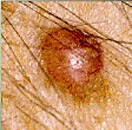
WEDNESDAY, April 21 (HealthDay News) — Too few middle-aged and older white Americans are being screened for skin cancer, a particular problem among those who did not finish high school or receive other common cancer screenings, a new study has found.
Researchers analyzed data from 10,486 white men and women, aged 50 and older, who took part in the 2005 National Health Interview Survey. Only 16 percent of men and 13 percent of women reported having a skin examination in the past year.
The lowest rates of skin cancer screenings were among men and women aged 50 to 64, people with some high school education or less, those without a history of skin cancer, and those who hadn’t had a recent screening for breast cancer, prostate cancer or colorectal cancer.
“With those older than 50 being at a higher risk for developing melanoma, our study results clearly indicate that more intervention is needed in this population,” study author Elliot J. Coups, a behavioral scientist at the Cancer Institute of New Jersey and an associate professor of medicine at UMDNJ-Robert Wood Johnson Medical School, said in a news release from the institute.
“Of particular interest is the amount of education one has and how that may affect whether a person is screened or not screened for skin cancer. Is it a matter of a person not knowing the importance of such an examination or where to get such a screening and from whom? Is it a matter of one’s insurance not covering a dermatologist or there being no coverage at all? We are hopeful this study leads to further discussion among health-care professionals, particularly among community physicians, about what steps can be taken to ensure their patients are receiving information on skin cancer screening and are being presented with opportunities to receive that examination,” Coups said.
Skin cancer is the most common of all cancers, according to the American Cancer Society. Melanoma accounts for about 5 percent of all skin cancer cases, but causes the most skin cancer deaths. Unlike many other types of cancers, the death rate for melanoma has been steadily rising over the past 35 years.
The study appears online April 19 and in the May issue of the American Journal of Medicine.
More information
The U.S. National Cancer Institute has more about skin cancer screening.

